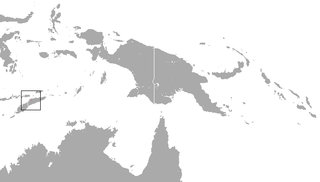 W
WThe bicolored roundleaf bat is a species of bat in the family Hipposideridae found in Indonesia, Malaysia, the Philippines, Thailand, and Timor-Leste. This bat inhabits caves, rock crevices and tunnels among lowland forests. They roost in large numbers and consumer mostly small winged insects. Their navigation and hunting skills come from the use of echolocation. Its leafnose is used to release ultrasonic shouts to distinguish its surroundings. Echolocation is also used to distinguish other species based on their wingbeat and size. The habitat of this bat decides the color of its fur. Bleaching fumes of a cave environment will cause an orange colored fur. Those who inhabit a well-ventilated roost will be a light brown color.
 W
WThe black-bearded tomb bat is a species of sac-winged bat. It is found in South and South East Asia.
 W
WThe lesser Asiatic yellow bat is a species of vesper bat. It is found in Bangladesh, India, Indonesia, Malaysia, Pakistan, the Philippines, Sri Lanka, and Taiwan.
 W
WThe lesser bamboo bat or lesser flat-headed bat is one of the smallest species of vesper bat, and is native to Southeast Asia.
 W
WThe Timor roundleaf bat is a species of bat in the family Hipposideridae. It is endemic to Indonesia.
 W
WGeoffroy's rousette is a species of megabat or Old World fruit bats. It is one of 10 species in the genus Rousettus.
 W
WThe greater bamboo bat is a species of vesper bat in the family Vespertilionidae. It is found in Cambodia, China, India, Indonesia, Laos, Malaysia, Myanmar, the Philippines, Singapore and Thailand.
 W
WThe least pipistrelle is a species of vesper bat.
 W
WThe crab-eating macaque, also known as the long-tailed macaque, is a cercopithecine primate native to Southeast Asia. It is referred to as the cynomolgus monkey in laboratories. It has a long history alongside humans; it has been alternately seen as an agricultural pest, sacred animal in some temples, and more recently, the subject of medical experiments.
 W
WThe northern common cuscus, also known as the grey cuscus, is a species of marsupial in the family Phalangeridae native to northern New Guinea and adjacent smaller islands, but is now also found in the Bismarck Archipelago, southeast and central Moluccas, the Solomons, and Timor, where it is believed to have been introduced in prehistoric times from New Guinea. It was formerly considered conspecific with the allopatric P. intercastellanus and P. mimicus.
 W
WSody's yellow house bat is a species of vesper bat. It is native to Indonesia, Malaysia, and Timor-Leste. This species was described in 1936.
 W
WThe Sumba roundleaf bat is a species of bat in the family Hipposideridae. It lives in Indonesia and East Timor. It is present on the islands of Sumba, Rote, Sumbawa, Flores, Semau, and Savu.
 W
WThe Sunda shrew is a species of mammal in the family Soricidae found in Indonesia and Malaysia.
 W
WThe Timor shrew or thin shrew is a species of mammal in the family Soricidae. It is endemic to Timor. It is threatened by habitat loss.
 W
WThe Timorese horseshoe bat is a species of bat native to Timor-Leste.